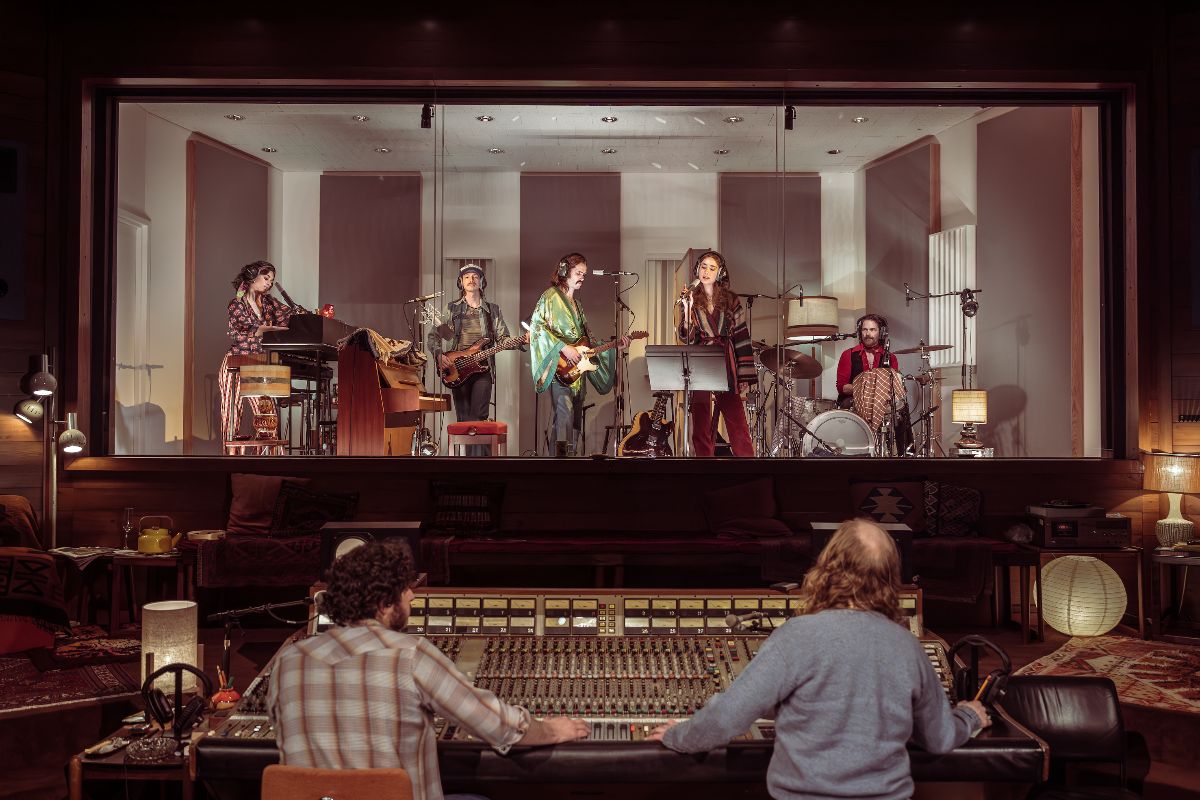Stereophonic play review: Fleetwood Mac musical is a sensation


Stereophonic play review and star rating: ★★★★★
Stereophonic is a mighty test of endurance. At three-and-a-half hours, there are points in the Herculean one-hour-fifty-minute first act where the audience unanimously agree to give up and start chatting. I’ve never seen so many people escape to the loo.
On this level, Stereophonic is one great meta remark about the agony of the creative process. About a fictitious band on the brink of stardom and their torturous journey to lay down a record in California in 1976, it might be one heck of an uncomfy watch – West End theatre seats aren’t made for four-hour stints – but that’s exactly how it’s supposed to feel.
Through extrapolating the fallouts, tender moments and disagreements that happen over a year of intense studio sessions, Stereophonic represents how good art can derive from obscenely dark places. As characters lackadaisically drift from studio to mixing room – the studio is at the back of the stage, the mixing room at the front – inter-group tensions are only ever a drumbeat away.
Stereophonic: play takes inspiration from the story of Fleetwood Mac
Stereophonic seems inspired by the recording period of Fleetwood Mac’s Rumours, in which the band were torn apart by drug use and toxic relationships. Playwright David Adjjmi denies this, but the inter-group dynamics – an American-British couple and British drummer, as well as the play being set where the Rumours was recorded in Sausalito – bear too close a resemblance for the parallels not to be drawn.
The notion of the tortured genius can seem trite, but writer Adjmi goes to incredible lengths to take these characters beyond cliche. Within David Zinn’s claustrophobic studio set, the atmosphere is at a knife edge: drunken flirtations transform into bitter spats as the band, exasperated by the sight of one another, try to finish the record. As a viewer experience, it is sordidly watchable. Who will erupt next?
Daniel Aukin’s fluid, naturalistic direction is hypnotic. He finds depth from the whole cast, although Jack Riddiford is the most compelling as Peter, a guitarist and vocalist in the band whose talent is immense, yet he cannot control his incessant bursts of rage especially towards his girlfriend, vocalist Diana, given incredible stoicism by Lucy Karczewski.
Zachary Hart must be dealing with nightly muscle spasms as drug-addled bassist Reg, who spends the duration of the show crumpled over in half, either in agony or to snort his next line. Nia Towle finds depth as Reg’s exasperated wife Holly, and there’s some incredible comic relief from beleaguered techy Grover, played by Eli Gelb, whose rose-tinted perspective fades after the 60th re-record. Andrew R Butler’s sound engineer Charlie is the sort of great literary character conceived for very little else than slapstick and, blimey, do we need his energy amid all the meltdowns.
As for the music, Arcade Fire’s Will Butler has crafted the sort of immense piano rock melodies that could very well have ended up on an award-winning record for his own band. Occasionally they stop arguing long enough to break into spectacular musical interludes, with everything played live on stage. The songs sound so good there’s nervous laughter from the audience.
It’s no wonder the 2024 Broadway production landed 13 Tony Award nominations, breaking the record of 12 previously set by race satire Slave Play. That the actual show-stopping music becomes almost a footnote is testament to how much there is say about this play.
The Stereophonic play runs at the Duke of York’s theatre until 20 September






